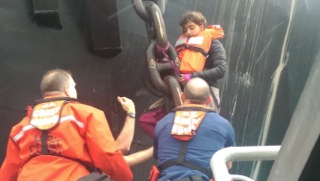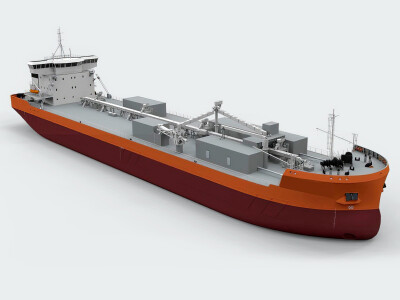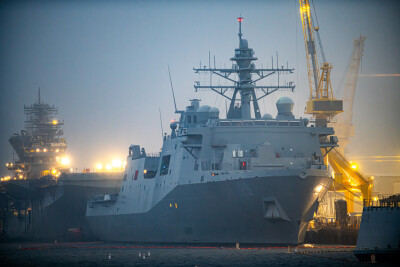After a wet night lashed to the anchor chain of the Shell offshore support vessel Arctic Challenger, activist Chiara D’Angelo called down to a waiting Coast Guard boat crew in the harbor at Bellingham, Wash., north of Seattle.
“It was cold, rainy and she was starting to display signs of hypothermia,” said Chief Warrant Officer Charles Chavtur, commander of Coast Guard Station Bellingham, whose crews have been keeping an eye on protests around Shell vessels being prepared for the company’s Chukchi Sea expedition. The plan has drawn demonstrators opposed to the risks of drilling in the Arctic and opening new fossil fuel sources.
D’Angelo’s Monday morning descent followed the surrender of fellow protestor Matt Fuller, who had joined her on the chain Saturday and came down at 4:30 a.m. Sunday. Chavtur said D’Angelo was helped down the anchor chain, given water and blankets, and taken back to the station to be evaluated by emergency medical technicians. She was released to family and friends.
The 310’x104’ Arctic Challenger is attracting particular attention from activists in the “Shell No” campaign because it is a key part of Shell’s “cap and contain” submersible recovery system for dealing with seafloor well failures. Built in 1976 for Arctic duty, the barge was converted by Superior Energy Services over two years in Bellingham to recover hydrocarbons – oil to be collected and natural gas to be flared off at the surface.
A week before, hundreds of activists in kayaks converged on the port of Seattle to demonstrate again the 400’x292’x30’ Polar Pioneer semisubmersible rig that Transocean will operate for Shell. The city’s port has been a hub for equipment and services to the Alaska oil fields for decades. But now amid heavy political pressure Seattle Mayor Ed Murray and the city council pushed port officials to reconsider their terminal lease with Shell contractor Foss Maritime.
The Coast Guard has taken a soft approach to activists, but is enforcing a safety zone around the Arctic Challenger. Fuller was issued a summons for the anchor chain stunt and then released, and the Coast Guard intercepted and cited for others for violating the zone. Two small boats had their voyages terminated for lack of required safety equipment, and an inflatable was impounded when the operator could not show proof of ownership.
“The Coast Guard has a duty to promote the safety of life at sea, which includes the encouragement of safe navigation in our ports and waterways by all waterway users,” Lt. Cmdr. Justin Noggle, chief of enforcement at Coast Guard Sector Puget Sound, said in a statement. “The Coast Guard respects the First Amendment Rights of people to safely and lawfully assemble on the water. To that end, we will enforce those laws and regulations necessary to ensure the safety of the maritime public.”





